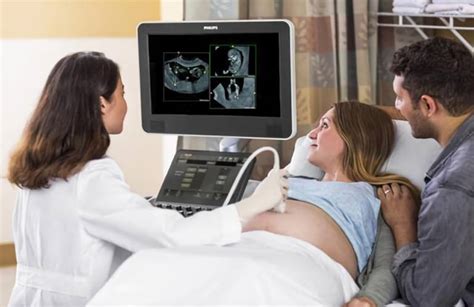The field of obstetrics has witnessed significant advancements in recent years, thanks to the integration of obstetric technology, commonly referred to as "OB Tech." This revolutionary technology has transformed the way healthcare providers approach prenatal care, labor and delivery, and postpartum care. By harnessing the power of data analytics, artificial intelligence, and innovative medical devices, OB Tech has improved patient outcomes, enhanced the birthing experience, and reduced healthcare costs.
OB Tech has the potential to revolutionize obstetrics in numerous ways, from enhancing prenatal care to streamlining labor and delivery processes. In this article, we will explore five ways OB Tech is transforming the field of obstetrics and improving patient care.
1. Enhanced Prenatal Care through Data Analytics

Prenatal care is a critical component of obstetrics, and OB Tech has improved this process through the use of data analytics. By leveraging advanced algorithms and machine learning techniques, healthcare providers can analyze vast amounts of data from electronic health records (EHRs), medical devices, and other sources to identify high-risk pregnancies and develop personalized care plans.
For example, data analytics can help healthcare providers detect potential complications, such as gestational diabetes or preeclampsia, earlier in the pregnancy. This enables timely interventions and reduces the risk of adverse outcomes. Additionally, data analytics can help healthcare providers optimize prenatal care schedules, ensuring that patients receive the right care at the right time.
Benefits of Data Analytics in Prenatal Care
- Improved detection of high-risk pregnancies
- Personalized care plans tailored to individual patient needs
- Enhanced patient engagement and education
- Reduced risk of adverse outcomes
2. AI-Powered Fetal Monitoring

Fetal monitoring is a critical aspect of labor and delivery care, and OB Tech has improved this process through the use of artificial intelligence (AI). AI-powered fetal monitoring systems can analyze fetal heart rate patterns and detect potential complications, such as fetal distress or umbilical cord compression.
These systems can also provide real-time alerts and notifications to healthcare providers, enabling prompt interventions and reducing the risk of adverse outcomes. Additionally, AI-powered fetal monitoring systems can help healthcare providers optimize labor and delivery care, reducing the need for unnecessary interventions and improving patient satisfaction.
Benefits of AI-Powered Fetal Monitoring
- Improved detection of fetal distress and other complications
- Real-time alerts and notifications for healthcare providers
- Optimized labor and delivery care
- Reduced need for unnecessary interventions
3. Virtual Prenatal Care and Telemedicine

Virtual prenatal care and telemedicine have become increasingly popular in recent years, and OB Tech has improved this process through the use of advanced video conferencing platforms and mobile apps. These platforms enable healthcare providers to remotely monitor patients, provide education and support, and conduct virtual consultations.
Virtual prenatal care and telemedicine have numerous benefits, including improved patient engagement, reduced healthcare costs, and enhanced access to care. Additionally, these platforms can help healthcare providers optimize prenatal care schedules, reduce the need for unnecessary office visits, and improve patient satisfaction.
Benefits of Virtual Prenatal Care and Telemedicine
- Improved patient engagement and education
- Reduced healthcare costs
- Enhanced access to care
- Optimized prenatal care schedules
4. Innovative Medical Devices

OB Tech has led to the development of innovative medical devices that have improved the birthing experience and reduced the risk of adverse outcomes. For example, wireless fetal monitoring systems enable patients to move freely during labor, reducing the risk of complications and improving patient satisfaction.
Additionally, OB Tech has led to the development of advanced medical devices, such as fetal scalp electrodes and intrauterine pressure catheters, which can help healthcare providers monitor fetal well-being and optimize labor and delivery care.
Benefits of Innovative Medical Devices
- Improved patient satisfaction and comfort
- Reduced risk of complications
- Enhanced fetal monitoring and care
- Optimized labor and delivery care
5. Streamlined Labor and Delivery Processes

OB Tech has improved labor and delivery processes through the use of advanced software platforms and data analytics. These platforms can help healthcare providers optimize labor and delivery care, reduce the need for unnecessary interventions, and improve patient satisfaction.
For example, OB Tech can help healthcare providers identify patients who are at risk for prolonged labor or other complications, enabling timely interventions and reducing the risk of adverse outcomes. Additionally, OB Tech can help healthcare providers optimize staffing and resource allocation, reducing healthcare costs and improving patient care.
Benefits of Streamlined Labor and Delivery Processes
- Improved patient satisfaction and outcomes
- Reduced need for unnecessary interventions
- Optimized staffing and resource allocation
- Reduced healthcare costs






What is OB Tech?
+OB Tech refers to the use of technology in obstetrics, including data analytics, artificial intelligence, and innovative medical devices.
How has OB Tech improved prenatal care?
+OB Tech has improved prenatal care through the use of data analytics, which enables healthcare providers to identify high-risk pregnancies and develop personalized care plans.
What are the benefits of AI-powered fetal monitoring?
+AI-powered fetal monitoring can improve detection of fetal distress and other complications, provide real-time alerts and notifications, and optimize labor and delivery care.
In conclusion, OB Tech has revolutionized the field of obstetrics in numerous ways, from enhancing prenatal care to streamlining labor and delivery processes. By harnessing the power of data analytics, artificial intelligence, and innovative medical devices, healthcare providers can improve patient outcomes, reduce healthcare costs, and enhance the birthing experience. As OB Tech continues to evolve, we can expect to see even more innovative solutions that transform the field of obstetrics and improve patient care.
